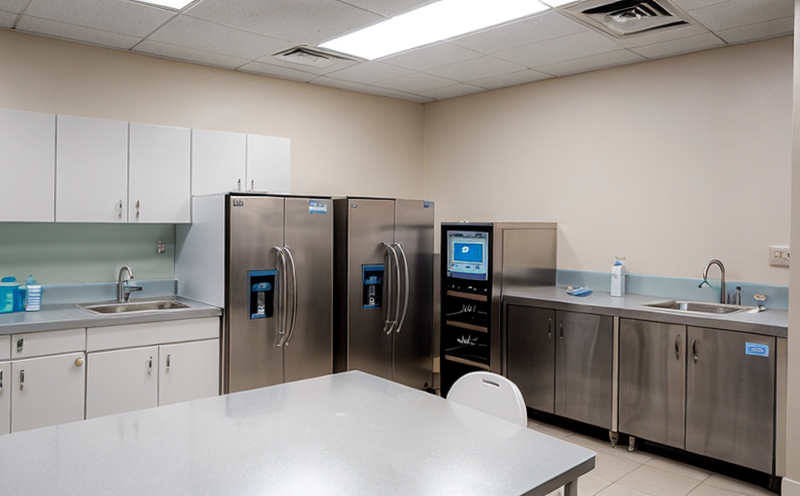UDI/Label Adhesion Integrity After Sterilization
The Unique Device Identifier (UDI) is a critical component of medical device regulation globally. UDI ensures traceability and facilitates tracking devices throughout the supply chain, from manufacturing to disposal. However, the integrity of this label after sterilization processes is paramount for its effectiveness. This service focuses on testing how well the UDI adheres to the packaging or device surface following sterilization, ensuring that labels remain intact and readable.
Sterilization validation testing involves demonstrating that a medical device remains safe and effective after sterilization. For devices with UDI labels, it is essential to verify that these labels do not detach, become unreadable, or otherwise compromise the device’s traceability. This service uses state-of-the-art equipment and methodologies aligned with international standards such as ISO 11135 for biological indicators and ASTM F836 for adhesive testing.
The process begins with careful preparation of specimens, which include the medical devices with their UDI labels in place. The sterilization parameters are carefully selected to simulate real-world conditions, ensuring that the test reflects actual use scenarios. Post-sterilization, the adhesion integrity is evaluated by measuring the force required to remove the label from the device or packaging material.
Our laboratory employs a range of sophisticated instruments designed specifically for this type of testing. These include peel testers and tensile strength machines capable of providing precise measurements that are crucial for accurate results. The testing process also involves assessing color change, opacity, and other visual aspects to ensure that the label remains intact post-sterilization.
The acceptance criteria for this service are stringent and adhere strictly to regulatory standards. A label is considered to have passed if it can withstand a specified force without tearing or becoming unreadable. The results of these tests provide critical data that help manufacturers ensure compliance with UDI regulations and maintain the integrity of their products throughout the sterilization process.
Understanding the importance of this test for quality managers, compliance officers, R&D engineers, and procurement professionals is essential. It ensures that devices meet regulatory requirements and can be effectively tracked in the supply chain. This service not only aids in meeting regulatory standards but also enhances the reliability and safety of medical devices by ensuring UDI labels remain intact post-sterilization.
Benefits
The benefits of this service are multifaceted, offering significant value to various stakeholders within the medical device industry. For quality managers, it provides a robust tool for ensuring that all products comply with regulatory standards regarding UDI labels. This ensures that each device can be traced accurately throughout its lifecycle.
Compliance officers benefit from having a reliable test method that helps maintain regulatory compliance. By demonstrating that the UDI label adheres properly after sterilization, they can ensure that devices meet all necessary requirements and avoid potential legal issues.
R&D engineers gain valuable insights into how different materials and processes affect the adhesion of labels during sterilization. This knowledge is crucial for optimizing product design and ensuring consistent performance across batches.
For procurement professionals, this service helps in evaluating suppliers by providing data on the reliability of their UDI labeling processes. It ensures that only high-quality components are used, enhancing overall product quality.
Why Choose This Test
Selecting a reputable laboratory for conducting UDI/Label Adhesion Integrity After Sterilization tests is crucial to ensure accurate and reliable results. Our laboratory offers several advantages over others in the industry:
- Expertise and Experience: We have extensive experience in medical device testing, particularly in the area of sterility validation.
- Advanced Equipment: Utilizing cutting-edge equipment ensures precise measurements and accurate results.
- Compliance with Standards: Our tests are conducted according to international standards such as ISO 11135 and ASTM F836, ensuring compliance with global regulations.
- Customized Solutions: We offer tailored testing solutions to meet the specific needs of each client, whether it's for a single product or an entire line.
- Timely Delivery: Our efficient processes ensure that results are delivered quickly, allowing clients to make informed decisions promptly.
By choosing our laboratory, you can be confident in the quality and reliability of your UDI/Label Adhesion Integrity After Sterilization tests. We pride ourselves on providing accurate, reliable, and timely results that meet or exceed regulatory requirements.
Quality and Reliability Assurance
The importance of quality and reliability assurance in the medical device industry cannot be overstated. Ensuring that UDI labels remain intact after sterilization is just one aspect of this broader commitment to quality. Our laboratory adheres strictly to international standards such as ISO 14971, which provides a framework for risk management throughout the lifecycle of a medical device.
Our testing process is designed not only to meet regulatory requirements but also to exceed them by providing additional insights into potential issues that may arise during sterilization. This proactive approach helps manufacturers identify and address problems early in the development stage, reducing costly recalls and ensuring patient safety.
We employ rigorous quality control measures throughout our testing processes. These include regular calibration of equipment, strict adherence to standard operating procedures (SOPs), and ongoing training for our staff to ensure they are up-to-date with the latest techniques and methodologies. By doing so, we maintain a high level of accuracy and consistency in all our tests.
In addition to these internal controls, we also participate in proficiency testing programs offered by recognized organizations such as the College of American Pathologists (CAP). These programs provide an independent assessment of our laboratory’s performance, further ensuring that our results are accurate and reliable.





